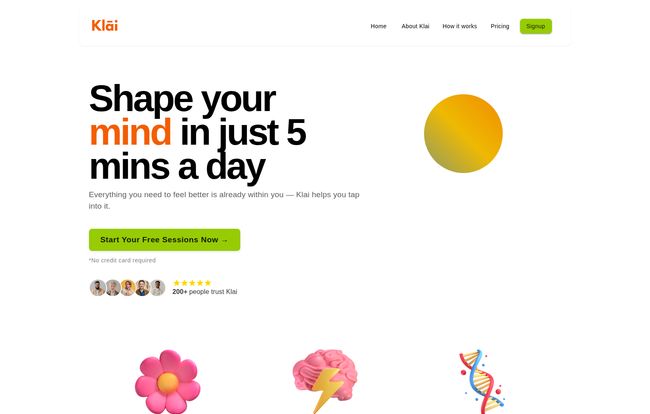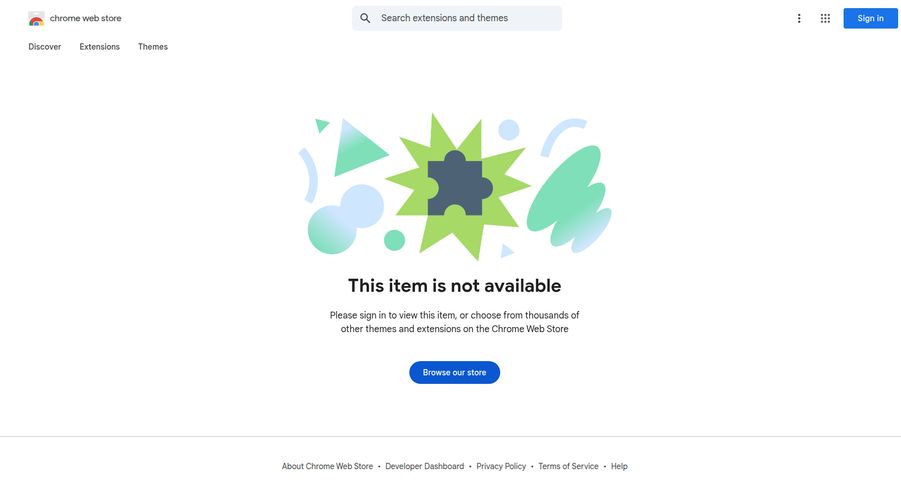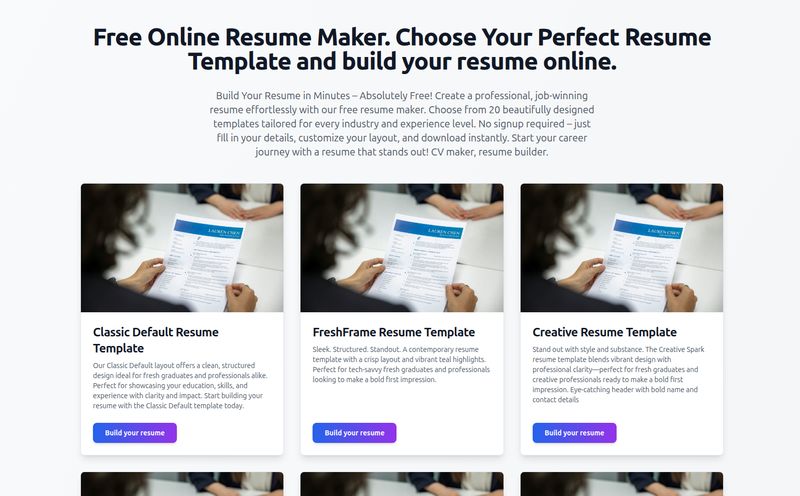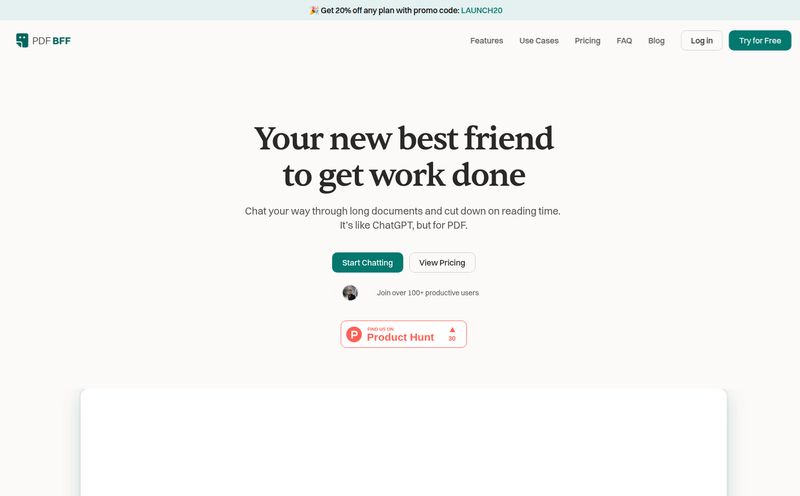The world of digital wellness is… crowded. You can’t swing a cat without hitting a new meditation app, a mindfulness chatbot, or a bio-hacking gadget promising to realign your chakras. I’ve seen them all. I’ve tried most of them. And honestly? A lot of them feel like a one-size-fits-all t-shirt that, surprise, doesn't actually fit anyone perfectly.
So when I stumbled upon Klai.me, I was intrigued but, you know, professionally skeptical. Its claim is bold: “Shape your mind in just 5 mins a day.” Instead of a library of pre-recorded sessions, Klai promises something different—something it calls “hyper-personalized” audio loops created by AI, just for you, in the moment you need them.
An AI that listens to how I'm feeling and crafts a unique session on the fly? It sounds like something out of a sci-fi movie. But as someone who’s always watching the trends in traffic and user engagement, I know that personalization is king. So, I decided to give it a proper look. Is this the future of mental self-care, or just another clever gimmick?
So, What Exactly is Klai.me?
At its heart, Klai.me is a tool designed to help you manage the usual suspects: stress, anxiety, and that general feeling of being overwhelmed. But it’s not a meditation app in the way you might think of Headspace or Calm. There’s no guru with a soothing voice guiding a group of thousands through the same breathing exercise.
Instead, Klai is more like a personal mental fitness coach. It starts by asking a simple question: “How are you today?” Based on your answer, its AI gets to work, generating a short, guided visualization loop. It’s designed to meet you where you are, adapting and evolving with you over time. Think of it as a mental chameleon, changing its colors to match your mood.

Visit Klai.me
The whole idea is built on the concept of neuroplasticity and creative visualization. Big words, I know. But the principle is simple: your brain can change, and one way to encourage that change is by repeatedly imagining positive outcomes and new responses. Klai’s job is to give you the script for that mental movie.
My Walkthrough of the Klai Experience
Getting started is ridiculously simple. No long sign-up forms, no 20-minute personality quizzes. You just tell it how you feel—Great, Good, Okay, Not so good, or Terrible. It then creates a loop for you. Done.
I saw some user stories on their site that give a good picture of how it's used in the real world. A project manager named Richard uses it for anxiety before stressful meetings. Another user, Cassie, found it helpful for managing a specific phobia, allowing her to walk past dogs without feeling overwhelmed. Then there's Anthony, who used it to get support for his journey to quit vaping.
This is what interests me most. It’s not just generic “relaxation.” It’s targeted support for very specific, very human problems. That’s a level of nuance you don’t get from a generic “Stress Less” playlist.
The Good, The Not-So-Good, and The AI in the Room
No tool is perfect, right? After poking around and thinking about it from an SEO and user-experience perspective, here’s my breakdown. No sugar-coating.
What I Really Liked About Klai
The personalization is, without a doubt, the star of the show. The feeling that a session was made just for me is powerful. It cuts through the noise. I’m not listening to something made for a million other people; I’m getting something for my specific, right-now feeling. In a market saturated with generic content, that’s a huge plus.
It's also incredibly easy to get into. The barrier to entry is basically zero. This is crucial for people who are already feeling stressed or anxious—the last thing they need is a complicated app to figure out.
Where It Gets a Bit Murky
My biggest question mark is the AI itself. It’s a bit of a “black box.” We’re told it’s smart and adaptive, but there’s not a lot of information on how it works. As a tech-curious person, I want to peek under teh hood. For some users, this won't matter at all. For others, putting their mental state in the hands of an unknown algorithm might feel a bit strange.
And let's be clear: this is a tool for building habits. Its effectiveness is going to depend entirely on your own consistency. If you use it once and expect miracles, you’ll be disappointed. It’s a mental gym, and you have to show up to get results. Finally, some people just prefer a human touch, and that’s perfectly fine. An AI, no matter how smart, may not be a substitute for a real human connection for everyone.
Let's Talk Money: Klai.me Pricing Breakdown
Okay, the all-important question: what’s this going to cost? I was pleasantly surprised here. They have a very clear, multi-tiered approach.
| Plan | Price | Key Features |
|---|---|---|
| Flow | £0 (Free) | 30 free visualization loops, 1 user journey, streak counter, save & download loops. |
| Rise | £7.99/month | Everything in Flow, plus 30 new loops/month, unlimited journeys, health insights, discounted 1:1 therapy. |
| Klai for Teams | £6.99/month per member | Team features, advanced analytics, discounted coaching sessions. |
My take? The Flow plan is one of the most generous free tiers I’ve seen. Thirty loops and the ability to save them is more than enough to see if it works for you. There's no reason not to try it. The Rise plan seems fairly priced for what it offers, especially the unlimited journeys and health insights. For under a tenner a month, it’s less than what most of us spend on coffee.
Who is Klai.me Actually For?
So who's the ideal user? In my opinion, Klai.me is perfect for the digitally-savvy individual who's tired of the same old meditation tracks. It's for the person who wants something quick, targeted, and intelligent. If you're a busy professional who needs a 5-minute reset between meetings, or a student dealing with exam stress, this could be a fantastic tool.
It's probably not for someone who is completely tech-averse or someone seeking a deep replacement for traditional therapy. It's a support tool, a very smart one, but still a tool. It sits in that interesting space between self-help books and one-on-one coaching.
It all comes down to what you’re looking for. Klai represents a fascinating direction for mental wellness technology—one that’s less about mass-produced content and more about a personal, adaptive experience. It feels like a small step toward a future where technology doesn’t just broadcast at us, but actually listens.
And in a world that feels like it’s constantly shouting, having a tool that just quietly listens and offers a bit of help? That’s something special.
Frequently Asked Questions
- Is Klai.me a replacement for therapy?
- Absolutely not. It's designed as a support tool to help manage daily stress and build resilience. The 'Rise' plan even offers discounted therapy, showing it's meant to work alongside professional help, not replace it.
- How is Klai.me different from apps like Calm or Headspace?
- The main difference is the AI-driven personalization. Instead of choosing from a pre-existing library, Klai generates a unique audio session for you based on your current emotional state. It's generative, not curated.
- Can I really use Klai for free forever?
- Yes. The 'Flow' plan is free and gives you 30 visualization loops with lifetime access to them. It’s a great way to use the service without any financial commitment.
- What kinds of problems can Klai help with?
- Based on the site, it helps with general stress and anxiety, but also more specific issues like managing phobias, dealing with work-related pressure, and supporting addiction recovery journeys (like quitting vaping).
- How long are the audio sessions?
- The platform is built around the idea of offering support in about 5 minutes, so the loops are designed to be short, effective, and easy to fit into a busy day.
- Is my personal data safe?
- Klai.me has a privacy policy listed on their website. As with any online service, especially one dealing with personal information, it's always a good idea to read through their policy to understand how your data is handled.
Reference and Sources
- Klai.me Official Website
- Klai.me Pricing Information
- A Primer on Neuroplasticity from Verywell Mind for additional context.



